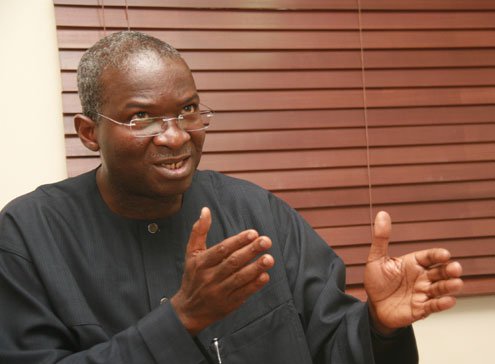This post has already been read 1787 times!
Works and housing minister Babatunde Fashola has said that massive investment in human capital development was “very crucial” to poverty reduction.
“It is important to invest in the development of personnel; there are competing demands for government’s limited resources, but we shall continue to pay special attention to human capital development,” Fashola said on Friday.
He spoke shortly after an inspection tour of the Electrical/Mechanical Training School, a training arm of the ministry located in Kuje, Abuja.
“We need to improve on the standards; we must acknowledge the vision of those who started this training school. Our desire is to improve it and maximise its potential.
“I think it is instructive that the interaction with the students is very fulfilling and revealing. They are learning new skills and human capacity development is being enhanced.
“People who have no jobs are also acquiring skills; people who have skills are certainly on their way out of poverty without a doubt.
“The more you know, the more skills you have, the better you will be; the more employment skills you will present if you are interviewed for a new job, the better you are if you are running your own business’’ Fashola said.
He added that apart from self-improvement, there was the potential benefit to the public service because the trainees would be better and more committed officers when they return to their offices.
On his observations after the inspection of the school facilities, the minister said that there was need to commit more resources to the school to improve its output.
“The quality of the learning environment is very important, so our directors, who are their supervisors, have taken note; we have also heard from the students who have demanded for more classroom space.
“So, we will deal with that, the Minister of State, Mr Abubakar Aliyu and I have had a little conversation, so he will see all of these places now in terms of the professional knowledge.
“The minister will help us to articulate what our standard workshop and standard classrooms for technical education engineering services should be.
“The students also said that they needed more learning aids, computers and machines. We will look at all of that and see what is possible within the limited resources of government,” he added.
He, however, advised the officers in charge of the workshops to pay attention to quality and structural integrity in their productions.
Mr Augustine Okwudiafor, Deputy Director, Zonal Workshop, who spoke on the challenges faced by the school, said that the ministry needed to recruit more artisans.
“We don’t have enough artisans because it is the artisans that are the skills men and they are the ones to be trained and they are the ones that do the jobs actually.
“Also, the engineers need more training and funding; with adequate funding, things will improve in the workshops,’’ Okwudiafor said.
On his part, Mr Elijah Idiong, Principal of the school, said that much was needed to improve the school, and expressed optimistic that the minister’s visit would impact positively on the school.
NAN reports that the Electrical/Mechanical Training School was established in 2018 to train low level manpower and personnel like drivers and mechanics to enable them have career progression in the civil service.
The school is equipped with workshops stuffed with different equipment such as lathe machines, milling machines, shaping machines, drilling and octagonal machines.It also has a functional foundry workshop, classrooms, offices and a gymnasium.
[NAN/The Guardian]



